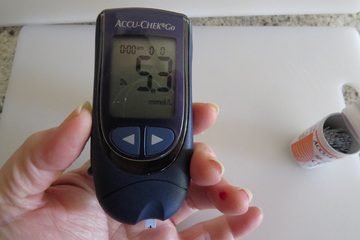Last Updated on January 6, 2026 by Rida Gul
Diabetes is a common disease that occurs when the level of blood glucose is too high. Blood glucose is your main source of energy and insulin helps glucose from food to get into your cells to be used for energy. Sometimes your body doesn’t make enough insulin and glucose then stays in your blood and doesn’t reach your cells. This is what leads to Diabetes.
The HbA1c test must be performed in the best diagnostic center in Hyderabadfor accurate analysis. It is primarily run to reflect average blood glucose levels. The results obtained can help you ensure whether you are out of risk or not.
As per doctors, the more is the glucose level in the blood,the more it becomes easier to determine the presence of Hemoglobin A1c on the blood cells. By performing HbA1c blood test, medical professionals can generate absolute reports that can help you take steps ahead towards further treatment and cure.
Before the test, no fasting is required, as this is one of the simplest blood tests. If a diabetic patient does not get cured completely then they should continue checking for the Hemoglobin A1c levels.
So, the HbA1c test may be used to check for diabetes or prediabetes in adults. And, if you are already suffering from diabetes, an HbA1c test can help examine your medical condition and glucose levels.
Table of Contents
Why do I need an HbA1c test?
It is recommended by CDC that the adults over the age of 45 should get tested to screen for diabetes and prediabetes. If your results appear to be normal, you should repeat the test after every 3 years. If your results show prediabetes, you must gettested after every 1-2 years. You should also talk to your doctor about taking crucial steps to reduce your risk of developing diabetes.
If you are below the age of 45, you may need to go for thetest, if you are affected with certain risk factors. These include, obesity, high blood pressure, history of heart disease and physical inactivity.
What happens during an HbA1c test?
During the procedure of HbA1c test, a medical professional will take some amount of blood from a vein in your arm. This is done using a small needle. After the needle is inserted, a small quantity of blood will be collected into a test tube. Possibly, you might feel a little sting when the needle goes in or out. You might experience it for less than five minutes.
Are there any risks to the test?
There is hardly any risk related to having a blood test. You may notice slight pain or some bruising at the spot where the needle was put in for the test. However, symptom usually goes away quickly.
What do the results mean?
The results are usually given in percentages. HbA1c below 5.7% indicates normal. If it is between 5.7% and 6.4%, it is indicative of pre-diabetes and if it goes higher than 6.5% then it indicates diabetes. If you might have questions about your results, talk to your health care provider.
If you have diabetes, the doctor recommends keeping your HbA1c levels below 7%. They may have other recommendations for you, depending on a number of factors such as health, age, weight, and other factors.
How does the HbA1c test work?
When the level of glucose builds up in the blood, it binds to the hemoglobin present in red blood cells. Thus, forming glycated hemoglobin. The glucose that combines with glycated hemoglobin is directly proportional to the sugar that is present in the system at that time.
The red blood cells present in the human body can survive for about 8-12 weeks before renewal. Therefore, measuring glycated hemoglobin can be used to reflect average blood glucose levels over that duration. This provides the right and helpfullong time monitoring of blood glucose levels. The higher is the level of glucose in the blood, the higher will be the level of hemoglobinA1C detectable on red blood cells.
What are the major benefits of lowering HbA1c?
Improving the level of HbA1c for people suffering from Diabetes cuts the risk of complications such asRetinopathy, Diabetic Nephropathy, Cataracts, Heart Failure, and Peripheral Vascular Disease.
How often HbA1c levels should be checked?
Doctors suggest that the Hemoglobin A1c levels may be examined every three months until a person with diabetes reaches the right treatment goals.Diabetic people are recommended to check their hemoglobin A1c every six months.
What can affect your HbA1c Result?
There are a number of factors that can affect your HbA1c results. This includes Kidney failure, liver disease, or severe anemia. Intake of certain medicines, including opioids and some HIV medications can also lead to the fluctuation in the results. Other less common factors could be blood loss, blood transfusions, and early or late pregnancy. You must inform your doctor if any of these factors apply to you and enquire if additional tests are needed.
If you are recommended to undergo HbA1c test, you must visit a well-equipped diagnostic center near you. You can check online to find out some of the popular diagnostic centers and book an appointment for the test.
Apart from this, if you want to know about Types of Dental Fillings then please visit our Health category

























